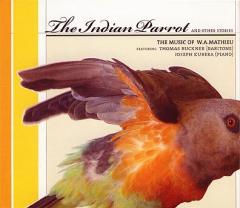W. A. MATHIEU / The Indian Parrot
Thomas Buckner (baritone); Joseph Kubera (piano); Devi Mathieu (soprano); Suzanne Elder-Wallace (alto); Bob Afifi (alto flute); Shira Kammen (viola); Daniel Kennedy (frame drums)
Mutable Music is pleased to announce this latest release by William Allaudin Mathieu, pianist, composer, teacher, recording artist, and author. A Parrot, Three Fish, and a Donkey is a modern piece with a medieval text, and medieval sensibilities have worked their way into the musical fabric: the small percussion instruments, the instrumental range lying (for the most part) within the range of the human voice, and, most of all, the harmony, which is a kind of modulating modality. Inspired by the universality of Rumi¹s poems, Mathieu felt especially free in this piece to borrow from many centuries of Eastern and Western harmonic practice.
Daniel Abdal-Hayy Moore's The Blind Beekeeper is a wonderful poem. It asks the soloist-narrator to simultaneously play so many roles. His first line is spoken: "I'd like to make a movie called The Blind BeekeeperŠ" and from then on he is above all a movie pitch-man -- and we are producer-angels deciding if we are going to invest in this guy's nutty movie. But he is also telling a dramatic and compelling story, empathizing with a diverse array of characters. And, since (at least in live performance) he will lead an audience of angels in transformative acts of bee-participation, he becomes our conductor as well. Finally, of course, he's a concert baritone giving a performance of a contemporary art song, a circumstance true even for the most post modern of us.
The piece is divided along the lines of a standard three-reeler: In the expository first reel (parts 1 and 2 of the text), we see Henry's history and very special talent; then we are inside the hive, and meet the bee protagonists. The second reel (part 3) is all action and adventure: the lover-bees get into serious trouble. The third reel (parts 4 and 5) is the triumphal rescue and final celebration. By the end we have seen a bee-movie about very small events as well as very large ones. Like a good children's story, it is at the same time a slightly silly tale and a noble miracle play.
TRACK LIST
A Parrot, Three Fish, and a Monkey (for 3 singers and small ensemble):
The Indian Parrot (7:32)
The Three Fish (6:01)
A Song About A Donkey) (8:21)
Where Everything Is Music (7:22)
Gourd Music (for piano):
Movement 1 (3:18)
Movement 2 (7:48)
Movement 3 (4:28)
Movement 4 (7:22)
The Blind Beekeeper (for baritone and piano):
Scene 1 (3:34)
Scene 2 (4:58)
Scene 3 (2:40)
Scene 4 (4:05)
Scene 5 (1:13)

